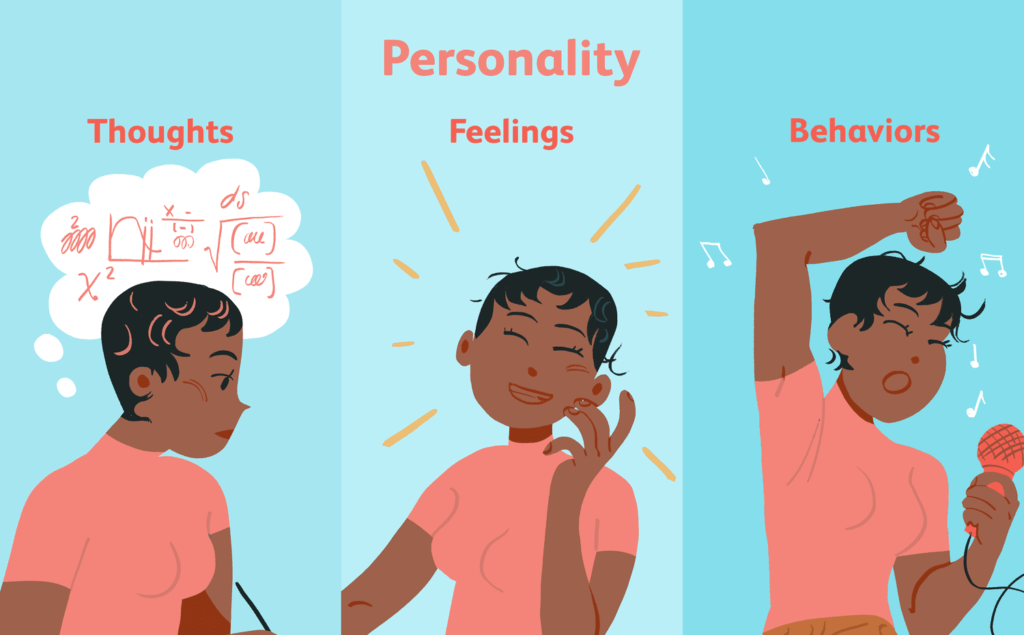Personality Theories in Psychology: Overview

Personality theories in psychology is the study of how personality develops. One of the largest and most popular psychology branches, researchers in this area also strive to better understand how personality influences our thoughts and behaviors.
Your unique personality makes you who you are; it influences everything from your relationships to the way you live. Learn more about what personality is, the theories surrounding its development. How personality is tested, and what it means to have a personality disorder. Personality theories seek to explain how personality forms, changes, and impacts behavior.
What is Personality Theories?
Table of Contents
TogglePersonality theory refers to a systematic framework or set of principles used to understand and explain the development, structure, dynamics, and functioning of personality. It encompasses various perspectives and approaches that seek to answer fundamental questions about what constitutes personality. How it develops, and how it influences behavior, thoughts, and emotions.
It seek to explain how personality forms, changes, and impacts behavior. Five key personality theories focus on biological, behavioral, psychodynamic, humanistic, and trait approaches.
5 Important Personality Theories
1) Psychoanalytic Theory:
Freud’s psychoanalytic theory posits that personality is shaped by unconscious forces, early childhood experiences, and conflicts between different structures of the mind (id, ego, superego). Freud emphasized the role of unconscious desires and defense mechanisms in shaping behavior.
Psychoanalytic theory, developed by Sigmund Freud, is one of the earliest and most influential theories of personality in psychology. It posits that human behavior and personality are largely determined by unconscious processes shaped by early childhood experiences, conflicts, and desires.
2) Behavioral Personality Theories:
Behavioral theories emphasize the role of learning and conditioning in shaping personality. They propose that personality is a collection of learned responses to environmental stimuli and reinforcement. Behavioral theorists study how behaviors are acquired, maintained, and modified through conditioning processes.
Behavioral theorists study observable and measurable behaviors, rejecting theories that take internal thoughts, moods, and feelings play a part as these cannot be measured.
According to behavioral theorists, conditioning (predictable behavioral responses) occurs through interactions with our environment which ultimately shapes our personalities.
3) Humanist Personality Theories:
Humanist theories emphasize the importance of free will and individual experience in personality development.5 Humanist theorists include Carl Rogers and Abraham Maslow.
Humanist theorists promote the concept of self-actualization, which is the innate need for personal growth and how personal growth motivates behavior. According to this approach, people are inherently good and have a natural tendency to want to make themselves and the world better.
They focus on self-actualization, personal agency, and the importance of subjective experiences in shaping personality. Humanistic theories highlight the role of personal choice and the pursuit of fulfillment in understanding personality.
4) Trait Personality Theories:
Trait theories focus on identifying and measuring consistent patterns of behavior, thoughts, and emotions (traits) that characterize individuals. Trait theorists believe that these traits are stable over time and across different situations, providing a framework for understanding and predicting behavior.
The trait theory approach is one of the most prominent areas in personality psychology. According to these theories, personality is made up of a number of broad traits.
5) Social-Cognitive Theories:
Social-cognitive theory integrates cognitive and behavioral perspectives with an emphasis on observational learning, modeling, and the influence of social interactions. Developed by Albert Bandura, this theory emphasizes the reciprocal relationship between individuals and their environment. And Suggesting that personality development occurs through cognitive processes such as attention, memory, and motivation.
social-cognitive theory offers a comprehensive framework for understanding how cognitive processes, behavior. And the social environment interact to shape personality and behavior over time. And it emphasizes the importance of learning from others, self-beliefs, and the reciprocal influence between individuals and their surroundings.
Characteristics of Personality
To understand the psychology of personality, it is important to learn some of the key characteristics of how personality works.9
1) Personality is organized and consistent. We tend to express certain aspects of our personality in different situations, and our responses are generally stable.
2) Although personality is generally stable, it can be influenced by the environment. For example, while your personality might make you shy in social situations, an emergency might lead you to take on a more outspoken and take-charge approach.
3) Personality causes behaviors to happen. You react to the people and objects in your environment based on your personality. From your personal preferences to your career choice, every aspect of your life is affected by your personality.
Frequently Asked Question
Q. What are the four personality theories?
The four personality theories are:
1) Psychoanalytic
2) Humanistic
3) Trait Perspective
4) Behaviorist Theory
Personality theories study how an individual develops their personality and can be utilized in studying personality disorders. These theories address whether personality is a biological trait or one that is developed through a person’s interaction with their environment.
Q. What is the purpose of personality theories?
It address the origins of personality as well as the traits that define a personality. These theories look to understand why people develop different character traits and respond to external and internal stimuli differently.
Q. What is the meaning of the term personality theory?
Personality theories have been used throughout history to address what makes up a person’s personality. An individual’s personality is how they think, feel, and behave.
Q. What is meant by theories of personality?
Theories of personality look at what makes up a personality and where a personality comes from. Theorists try to figure this out and create hypothesis.
Q. How do personality theories contribute to understanding individual differences?
It provide frameworks for understanding the origins, structure, dynamics, and variability of personality traits and behaviors across different individuals.
Q. What are the practical applications of personality theories?
Personality theories are applied in fields such as psychotherapy, career counseling, education, organizational psychology, and personal development. To enhance understanding, predict behavior, and promote individual well-being and success.
